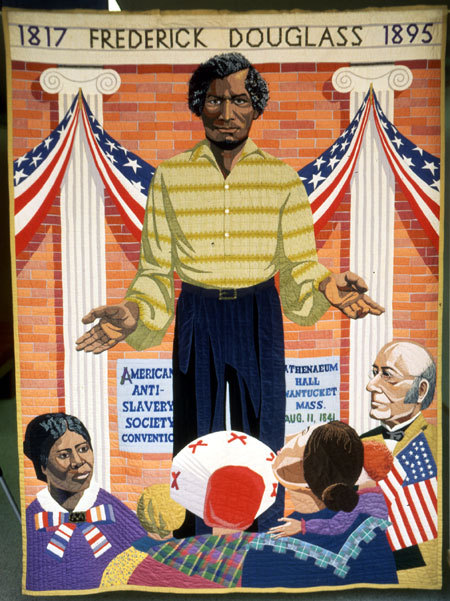
Frederick Douglass Quilt by the Negro History Club of Marin City & Sausalito, 1953
Happy African-American History Month! Today we continue our exploration of the USCIS History and Government questions and African American History. Today we will talk about USCIS 100:99. When do we celebrate Independence Day?*.
We will first read about Q99 from the USCIS M638 quick civics lesson. Then we will discuss the Declaration of Independence, the Compromise of 1850, and abolitionist Fredrick Douglass. Then we will listen to a short reading from Fredrick Douglass speech: “The Meaning of July Fourth for the Negro.” Note that Negro was a common term for Black or African-Americans, but it is not often used today. Let’s get started.
exerpt from The Meaning of July Fourth for the Negro by Fredrick Douglass
What, to the American slave, is your 4th of July?
I answer: a day that reveals to him, more than all other days in the year, the gross injustice and cruelly to which he is the constant victim.
To him, your celebration is a sham;
your boasted liberty, an unholy license;
your national greatness, swelling vanity;
your sounds of rejoicing are empty and heartless;
your denunciations of tyrants, brass fronted impudence;
your shouts of liberty and equality, hollow mockery;
your prayers and hymns, your sermons and thanksgivings,
with all your religious parade, and solemnity, are, to him, mere bombast,
fraud, deception, impiety, and hypocrisy—a thin veil to cover up crimes which would disgrace a nation of savages…
For more info:
See zinnedproject.org: Frederick Douglass Fights for Freedom
Watch actor Danny Glover read abolitionist Frederick Douglass's “Fourth of July Speech, 1852” on October 5, 2005 in Los Angeles, California. Part of a reading from Voices of a People’s History of the United States (Howard Zinn and Anthony Arnove.)
spazzneverslips-blog liked this
spazzneverslips-blog reblogged this from longmayshewave
longmayshewave posted this